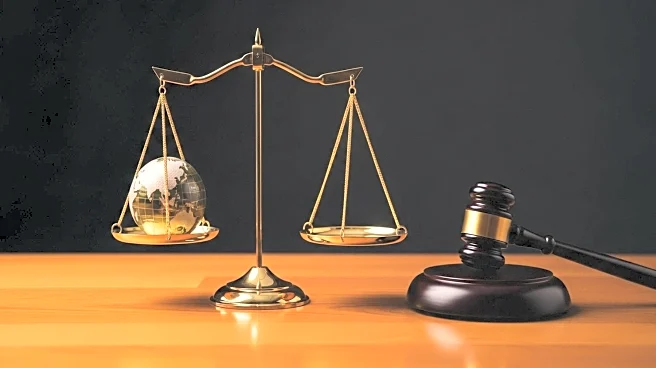What is the story about?
What's Happening?
A federal appeals court has ruled that President Trump's global tariffs, imposed through the International Emergency Economic Powers Act (IEEPA), were illegal. The court found that Trump exceeded his authority by using emergency powers to impose tariffs, which are not explicitly included in the statute's provisions. Despite the ruling, the tariffs remain in effect while the case proceeds, with the possibility of the Supreme Court reviewing the matter. The decision follows an earlier ruling by the Court of International Trade, which also found the tariffs to be improperly imposed. The administration has prepared options to pursue additional tariffs through other federal authorities, anticipating an appeal.
Why It's Important?
The ruling has significant implications for U.S. trade policy and international relations. If the tariffs are ultimately removed, it could disrupt trillions of dollars in global trade and affect the trade deals negotiated by the Trump administration. Businesses and states challenging the tariffs argue that they were used as negotiating tactics rather than addressing legitimate national emergencies. The decision could lead to demands for refunds of tariffs already paid, impacting U.S. economic stakeholders and foreign policy. The case highlights the limits of presidential authority under IEEPA and the need for clear congressional authorization for significant economic actions.
What's Next?
The administration may appeal the decision to the Supreme Court, which has previously supported President Trump on other matters. Alternatively, the Court of International Trade may revisit the scope of its ruling. The outcome could influence future trade negotiations and the use of emergency powers by the executive branch. Stakeholders, including businesses and foreign governments, are likely to closely monitor the developments, as the resolution of this case could have far-reaching consequences for international trade and U.S. economic policy.
Beyond the Headlines
The case underscores the legal and constitutional challenges of using emergency powers for economic measures. It raises questions about the balance of power between the executive and legislative branches in trade policy. The ruling may set a precedent for future administrations regarding the use of IEEPA and similar statutes. Additionally, the decision reflects broader judicial scrutiny of executive actions that have significant economic and political implications.
















